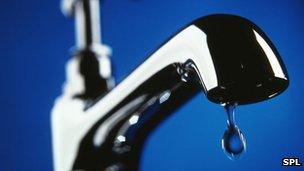Welsh Water prices to increase by 1.3% from April
- Published

Cardiff University research suggested Welsh Water is worth £1bn a year to the Welsh economy
Welsh Water prices are going up by 1.3% from April with average annual bills rising from £434 to £440.
The firm, which reported November half-year profits of £32m, said the rise was below-inflation for the fifth year - but its charges are among the highest.
It added that future rises would be at least 1% below inflation every year until 2020, and £1m a day was invested.
Severn Trent, which supplies many households in mid Wales, is putting up bills by 1.1%, averaging £333 a year.
That is the cheapest out of the 10 suppliers for water and sewerage services while Welsh Water's charge is the third most expensive behind Wessex Water and South West Water.
Welsh Water said the reason was down to sewerage costs as the area it covered included the second longest coastline in the industry, and £1bn had been invested to give Wales some of the highest quality rivers and coastal waters in the UK.
"Our focus is always on doing the right thing for our customers and earning their trust by delivering the best possible service at the most affordable price," said Welsh Water chief executive Chris Jones.
"With no shareholders, we've been able to return any gains we make to our customers for over a decade.
"We are delighted that we can keep our price increase below inflation for the fifth consecutive year, at a time of record investment in maintaining and improving our services whilst also helping more than 56,000 customers with their bills."
Water treatment
In June last year, research by Cardiff University suggested the company was worth £1bn a year to the Welsh economy.
Latest investment projects include new water treatment works processes across north Wales, serving 70,000 customers in Colwyn Bay and Llandudno.
Welsh Water has been owned and managed by not-for-profit company Glas Cymru since 2001.
It has no shareholders, which means any profits are put back into the business.
Since forming Glas Cymru in 2001, Welsh Water says it has been able to invest £1.5bn in water mains, reservoirs and sewers.
Figures released by all water companies on Monday showed that average increases for water and sewerage services would rise by 2% - with Thames rising by 3.4%, the only to be above the inflation rate of 2.7%.
- Published14 November 2013
- Published13 June 2013
- Published17 May 2013
- Published5 June 2013
- Published25 April 2013
- Published25 April 2013
- Published5 February 2013